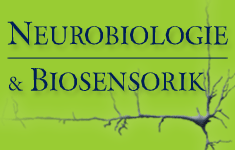- GU Home
- Biowissenschaften
- Institute und Einrichtungen
- Institut ZN
- Arbeitskreise
- Abt. Kössl
- Group Members
- Eugenia Gonzalez Palomares
About me
During my bachelor studies in Biomedical Sciences in the Autonomous University of Barcelona I became very interested in the nervous system and on how we perceive the world around us. After obtaining my bachelor's degree, I continued my studies in the field of Neuroscience by joining the Master of Interdisciplinary Neuroscience in Frankfurt am Main. In my Master thesis I studied auditory processing of natural sounds in the bat inferior colliculus using an information theoretic approach. I chose the AC lab for my Master thesis and I'm currently working towards my PhD in the same lab.
About my project
Publications
López-Jury, L.; García-Rosales, F.; González-Palomares, E.; Wetekam, J.; Hechavarria, J.C., (2022):
A neuron model with unbalanced synaptic weights explains asymmetric effects of ketamine in auditory cortex.
bioRxiv,Article Accepted in PLoS Biology.
García-Rosales, F.; López-Jury, L.; González-Palomares, E.; Wetekam, J.; Cabral-Calderín, Y.; Kiai, A.; Kössl, M.; Hechavarría, J.C., (2022):
Echolocation-related reversal of information flow in a cortical vocalization network.
Nature Communications, 13(1): 1-15.
López-Jury, L.; Garcia-Rosales, F.; González-Palomares, E.;, Kössl, M.; Hechavarria, J. C., (2021):
Acoustic context modulates natural sound discrimination in auditory cortex through frequency specific adaptation.
The Journal of Neuroscience, 41 (50): 10261–10277.
González-Palomares, E.; López-Jury L.; Wetekam, J.; Kiai, A.; García-Rosales, F.; Hechavarria, J. C., (2021):
Male Carollia perspicillata bats call more than females in a distressful context
Royal Society Open Science, 8 (5)
Enhanced representation of natural sound sequences in the ventral auditory midbrain.
Garcia-Rosales, F.; López-Jury, L.; González-Palomares, E.; Cabral-Calderin, Y.; Kössl, M.; Hechavarria, J. C., (2020):
Phase-amplitude coupling profiles differ in frontal and auditory cortices of bats.
European Journal of Neuroscience, 00: 1-19.
Frontiers in
Contact
Eugenia Gonzales Palomares
Goethe-University Frankfurt am Main
Institute for Cellbiology and Neuroscience
Campus Riedberg
Biologicum, building part A, 3rd floor
Max-von Laue-Straße 13
60438 Frankfurt am Main
Room: 3.122
Email: s3957245(at)stud.uni-frankfurt.de
Phone: +49 69 / 798-42064
- Aktuelles und Presse
- Pressemitteilungen
- Öffentliche Veranstaltungen
- Uni-Publikationen
- Aktuelles Jahrbuch
- UniReport
- Forschung Frankfurt
- Aktuelle Stellenangebote
- Frankfurter Kinder-Uni
- Internationales
- Outgoings
- Erasmus / LLP
- Goethe Welcome Centre (GWC)
- Refugees / Geflüchtete
- Erasmus +
- Sprachenzentrum oder Fremdsprachen
- Goethe Research Academy for Early Career Researchers
- Forschung
- Research Support
- Forschungsprojekte, Kooperationen, Infrastruktur
- Profilbereich Molecular & Translational Medicine
- Profilbereich Structure & Dynamics of Life
- Profilbereich Space, Time & Matter
- Profilbereich Sustainability & Biodiversity
- Profilbereich Orders & Transformations
- Profilbereich Universality & Diversity






